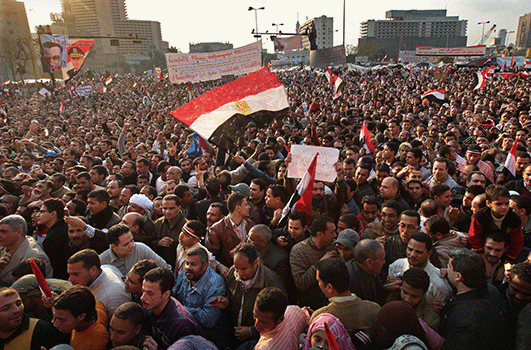Blood Bath in Streets of Cairo
August 15, 2013
Egyptian security forces yesterday attacked two encampments in Cairo from which Muslim Brotherhood members have protested the army’s overthrow on July 3 of President Mohamed Morsi. Armored vehicles and bulldozers crashed into the camps through a cloud of tear gas in an attempt to shut down the six-week-long sit-in. In and around the main encampment at Rabaa al-Adawiya, a constant exchange of gunfire, including snipers shooting from rooftops, raged for more than 12 hours. Elsewhere in the city, mobs retaliated against authorities with attacks on government buildings and a dozen police stations, as well as on Coptic Christian churches. At least 640 people were killed, including 43 security personnel and 3 reporters. The Interior Ministry has confirmed that more than 4,200 others were injured in the melee.
Egypt’s interim prime minister, Hazem Beblawi, speaking last night in a televised address, defended the operation, stating that authorities had no choice but to restore order to the capital. He declared a month-long state of emergency, including nightly curfews.

Anti-government protests have roiled Cairo since January 2011, beginning with demonstrations against President Hosni Mubarak, who resigned the following month. Massive anti-government protests prompted the army to remove the next president, Mohamed Morsi, from office this last July. (© John Moore, Getty Images)
Writing on a social networking site, a Muslim Brotherhood spokesperson, Gehad El-Haddad, called on Egyptians across the country to rise up in protest, declaring, “We will push forward until we bring down this military coup,” referring to the ouster of the former president. Yesterday’s attack is the third mass killing of Islamist demonstrators since Morsi’s overthrow.
The Egyptian army removed Morsi, Egypt’s first freely elected president, from power in the face of massive anti-Morsi protests across the nation. Many Egyptians believed that Morsi was more interested in turning Egypt into an Islamist state than in dealing with the country’s many problems. The lack of public security under Morsi undermined the economy, which remains in a desperate state. Tourism, Egypt’s biggest industry, has all but dried up since the fall of President Hosni Mubarak in 2011. More than 1 million people were thrown out of work during Morsi’s one year in office as president.
Additional World Book articles:
- Tahrir Square
- The Middle East: From Fall to Spring (a special report)
- Egypt (2011) (a Back in Time article)
- Egypt (2012) (a Back in Time article)


